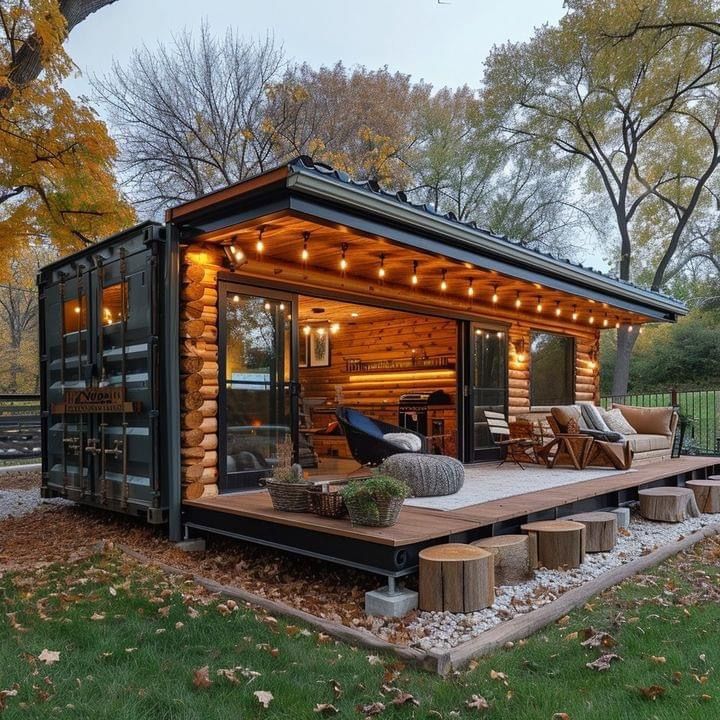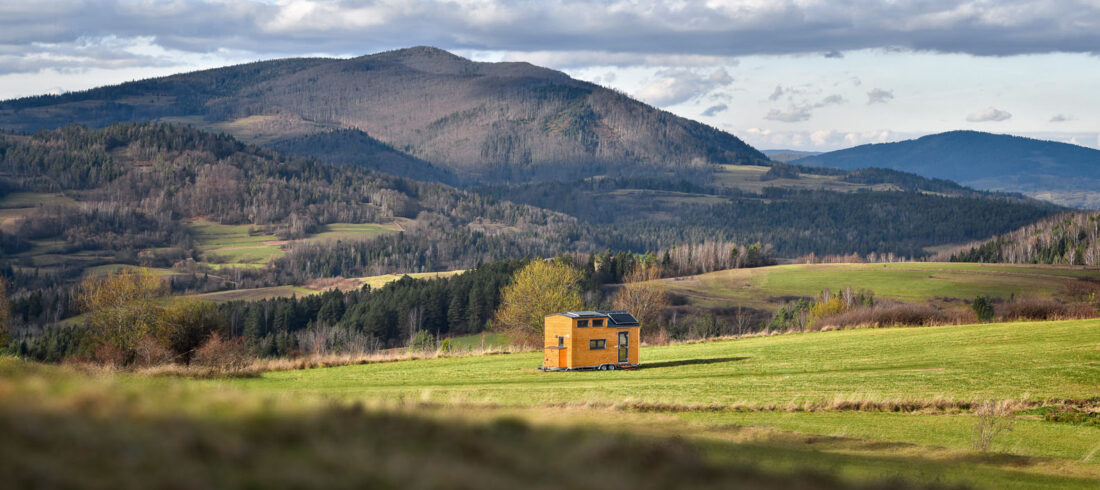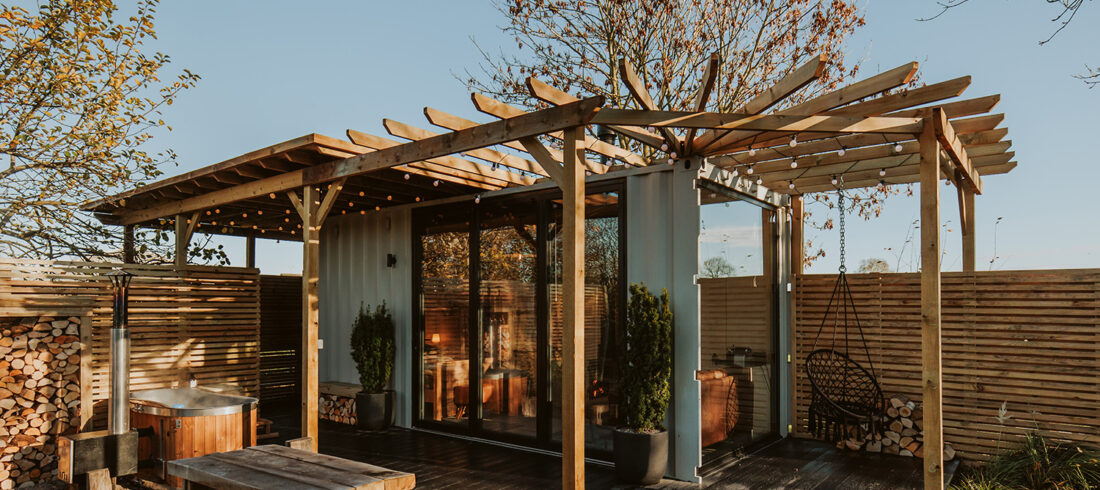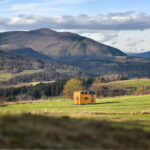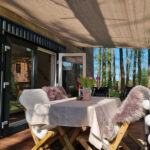It’s been estimated that around 75,000 people have made the switch to off-grid living in the UK. For every
one of the adventurers already enjoying a more fulfilling life, there are bound to be others who find the
idea appealing, but don’t really know much about the practical side of the equation. Ultimately, whiling
away your evenings among the sights and sounds of nature is a romantic notion but, in practise, what
does it take to live off-grid?
There are tons of articles out there explaining how the likes of Tiny Houses and shipping container
homes are changing perceptions of the way we live. However, there are precious few offering real life
advice about the day-to-day realities.
To remedy this, we were lucky enough to spend some time with a practising advocate of sustainable
living. Ian Freeborn has spent over 30 years dwelling off-grid, so knows exactly what it takes to be truly
self-sufficient. Here, he illuminates this often unexplained lifestyle with priceless insights gleaned from a
compelling life’s journey.
Living Off the Grid: Meanings and Definitions Simplified
If you ask 10 people to define the meaning of living off-grid, you’ll probably get 10 different answers. For
Ian, it’s relatively simple. He says, “It’s being as self-sufficient as possible, and being conscoiusly aware
of where our four basic human needs come from. The less dependant on mainstream society we are for
our water, food, shelter, or energy, the more in control of our own existence we are. Anyone that’s looking into living off-grid will soon become aware of where those things are coming from.”
In Ian’s opinion, this also means thinking about what you really need to get by and what you are prepared
to sacrifice. He explains that, “The main thing I always say to people about being off grid is it’s about
proiritising exactly what it is you need to live, and also what you are prepared to live without. It doesn’t
mean we have to go without but be more aware of what really matters to us and proiritising those needs
in terms of our use of energy and resources. For example, taking a daily shower for 5 minutes instead of
10 would save a significant amount of energy over a year.
When the relative cost saving of this is presented as £500, the small sacrifice made becomes quite an attractive proposition. The point is, being more aware of of our consumption of energy allows us to conserve and direct resources elsewhere. We can still have our little luxuries. Some would be appauled at having to limit their shower time to 5 minutes but I’d chose to save £500 a year and spend this money on a mini break or some fruit trees. “
At its core, off-grid life isn’t really dependent on the form your life takes. Whether you’re living in a
shipping container, mobile home, or van, it all comes down to how prepared you are to make sacrifices.
For those who do, the advantages are plentiful.
The Benefits of Life Off-Grid
Do you enjoy the great outdoors? Perhaps you’ve found that the rustle of leaves and chirping of
blackbirds is all it takes to emotionally and spiritually recentre? If this is you, Ian suggests that this
nourishing lifestyle could be a great option.
It works for him because, as he explains, “I really have a strong connection with nature. I enjoy being in
an environment where I can immerse myself in the energy of trees and wildlife. It has a profound relaxing
and healing effect on me. That’s my happy place and that’s where I choose to be and that’s why I chose
to live off-grid most of my life, because that’s really important to me.”
The steady increase in off-grid enthusiasts suggests that the pleasure to be found in trading skyscrapers
for streams isn’t unique to Ian. And it’s easy to see why. Aside from the stunning surroundings, there’s
also the likelihood of reduced living expenses, greater independence, and a minimal carbon footprint to
enjoy. Do these factors help to explain the studies suggesting two hours per week in the great outdoors
improves mental (and physical) health?
On the subject of these benefits, he says, “From a mental health point of view, and from a stability point
of view, I feel connected with nature. Yeah, I feel blessed. I’ve been able to engineer a position in my life
that allows me to do that, pretty much whenever I want to.”
Less bills, breathtaking views, no more rush hour trains, and a clear head. Sounds amazing, but is there
anything you should know before you take the plunge?
What Does it Take to Live Off Grid? The Everyday Challenges
If you’re asking, “What does it take to live off-grid?” it’s important to receive a balanced response forged
in hard-earned experience. This means thinking about features you might currently take for granted, such
as energy consumption and seemingly minor daily priorities. Although Ian clearly enjoys a simpler
existence, he urges potential sustainable lifers to think about these challenges before making a
commitment.
What kind of subjects occupy his thoughts on an ‘average’ day? “What you’re going to use your energy
on,” he says without hesitation. “You only have a certain amount of energy for each day — and you only
have so many watts to go about all your daily business. Limiting screen time becomes a necessity,
questioning and prioritising what you really need becomes key”
“What do I really want to prioritise?” he reflects. “Some people absolutely need to have a hot cup of
coffee every morning and other people will have their own different priorities and needs. So the first step
to being off-grid is actually rethinking and assessing what your energy requirements and actual needs
are. And then you might think, actually, I can kind of get away without having a hot cup of coffee every
morning if it means that I can use my energy for another purpose instead.”
Although making sacrifices is currently a fundamental aspect of living sustainably, the picture is always
improving. From long-lasting lithium batteries to the latest water filtration systems, there are a range of
promising options for anyone who is drawn to the lifestyle but concerned by the demands. These
constant advances in technology are designed to address the main challenges of a back-to-nature existence. Who knows what new solutions could be in store as progress continues to march ever-
forward?
Ian’s Story: 30-Years Off-Grid
Ian has been on a fascinating journey towards self-sufficiency. Although his progress was originally borne
out of necessity, it soon turned into a lifelong passion. Clearly he was cut out for sustainable living from
an early age and has seen this flower in adulthood. So how did it all begin for him?
“I’ve been living off-grid virtually my whole life, since I was 20 and came back from university.” Facing
reduced living space, he was forced to think on his feet. “I took a wooden garden shed and put a brick
extension on the side. I ended up living there for seven years. It was completely off-grid, apart from a
phone line.”
One of the biggest challenges for any off-gridder is regulating heat. There are lots of options out there for sustainable energy sources, from solar panels to biomass boilers. So, what did he do to stay warm
during the chilly winter months?
“I had a log burning fire and lived in this lovely garden shed for seven years. The small space was easy
to heat but I had to evolve the building to perform better as time progressed. It inprinted on me the
importance of reducing heat loss and the necessity of good insulation. ”
For Ian, these humble beginnings were just the start. “I then bought a van and converted it into a
motorhome. I’ve had one ever since and I’m over 50 now. I’ve lived off-grid part time for most of my life. I
have been lucky enough to mostly live in a house during winters. The british winter can be harsh for the
outdoor lifer, not so much for the cold but lack of light evenings. My experience of having to keep warm
and conserve resources made me really appreciate my energy consumption.”
His next step was to purchase a plot of land and expand further. He says, “With the money I’d saved on
rent and making small accumulated savings over the years, I managed to buy a small holding and start a
farm. I live there now, in my motorhome, most of the time. Its been a long but worthwhile journey. I’m
still in the process of making the jump to become completely off-grid and completely self-sufficient.”
Ian suggests that it’s possible to adapt by taking smaller steps to ease gradually into the experience,
saying, “[For many people] it could be a halfway house for a period of time to get used to those things.
That might mean living in a van part of the time, or even going off hiking in the hills for two weeks with a
tent and really assessing what your basic needs are.”
Tips For Budding Off-Gridders
As someone well-versed in the rigours of staying outdoors, Ian is perfectly placed to give advice on the
subject. Understandably, energy efficiency is one of his biggest areas of consideration. However, he also
encourages people to take the time to resolve other vital factors, such as their food supply and storage
space.
Design or choose a living unit to be as efficient in its use of energy as possible:
Passive Heating: Orient your unit from north to south to expose your living space to sunlight for as much
of the day as possible. Install Good Insulation: Adequate insulation can make your home more energy
efficient. Consider Triple Glazed Windows: The extra sealed space you find between three panes of
glass will help you to retain warmth for longer. Use an efficient electricity system: A 12v system is
sufficient for most needs, led lighting, phone charging etc.
Consider multiple jobs: It’s not uncommon for Van lifers or people who live in shipping containers on
farms to pick fruit or help out with other tasks in exchange for access to a small plot of land and some
food supplies.
Collaborate: Exchange what knowledge, talents or skills you may have to gain maximum advantage.
Work together as a part of a group or commnuity to consolidate and share skills and resources.
Start growing food: The more you can grow, the less you need to buy. Plus you know where its come
from and whats gone into it. Food is our sustainance and medicine.
Take it slowly: Self-sufficiency is a progressive scale that shouldn’t be rushed. Ease yourself into the
lifestyle, learning and adapting along the way. Take the plunge and give it a go. Don’t be afraid to make
mistakes, that how we learn to do it better next time. Each little bit that you can do at every stage will help you in the long-term.
Start Your New Life Today with Live Off-Grid
Are you ready to join the thousands of people who have already started their exciting new life? It’s a
challenging journey for sure, but one that offers incredible potential benefits. From young couples
struggling to get a grip on the property ladder to families who want to start afresh and reconnect with
nature, more and more people are making the switch.
Live Off-Grid was founded as a counterpoint to the strain and excess of modern living. By repurposing
shipping containers into modern and elegant dwellings, we have been able to provide access to all the
benefits of self-sufficient living without compromising on comfort. Our units range from cosy Tiny Houses
to vast interlocked containers such as the stunning Saturn. Alongside living spaces, they can be used as
offices, gyms, social spaces, and much more.
If you consider yourself to be a potential pioneer like Ian, the star of our article, now could be the time to
make the change. A fulfilling new life could be out there waiting for you.
